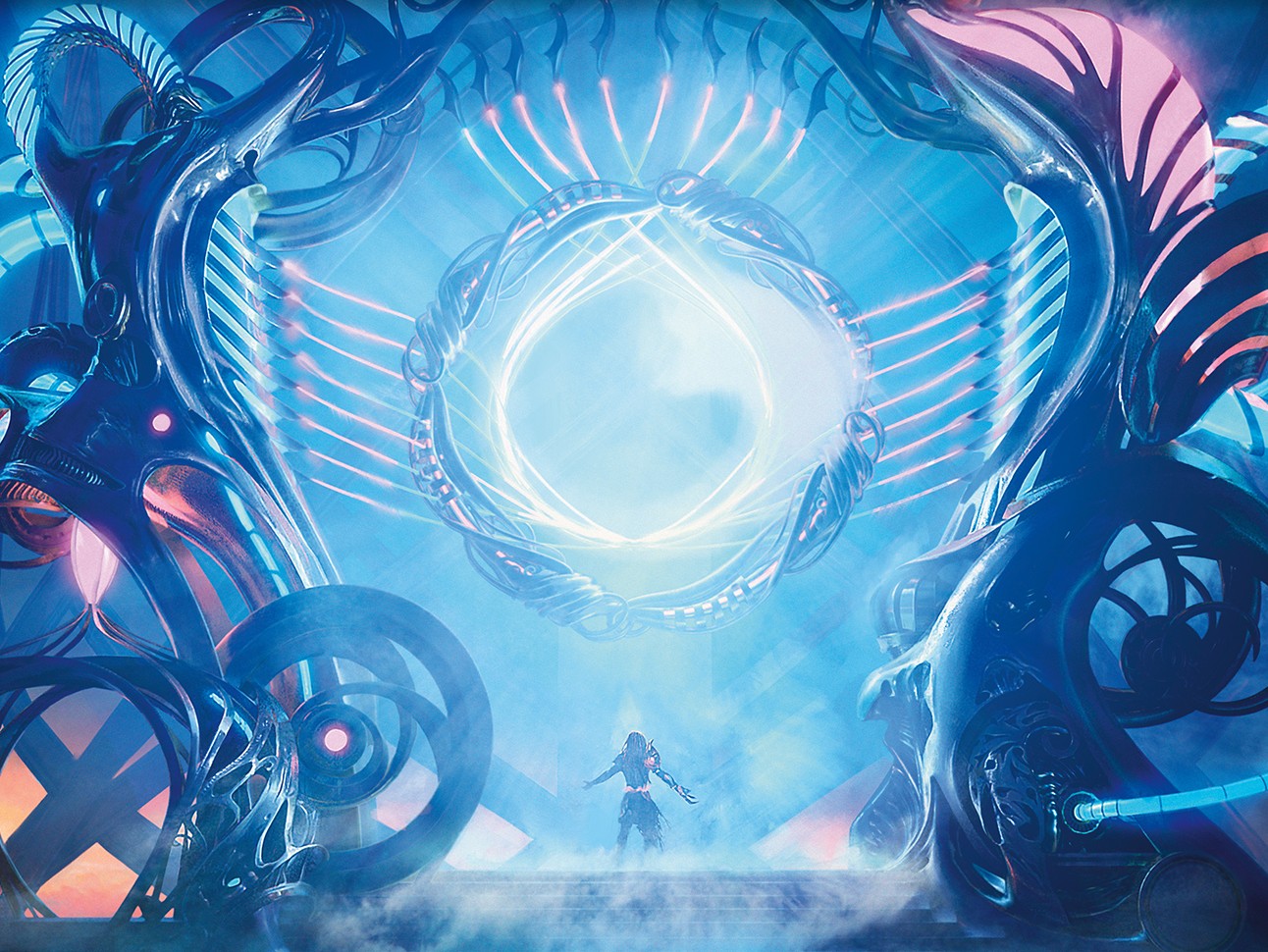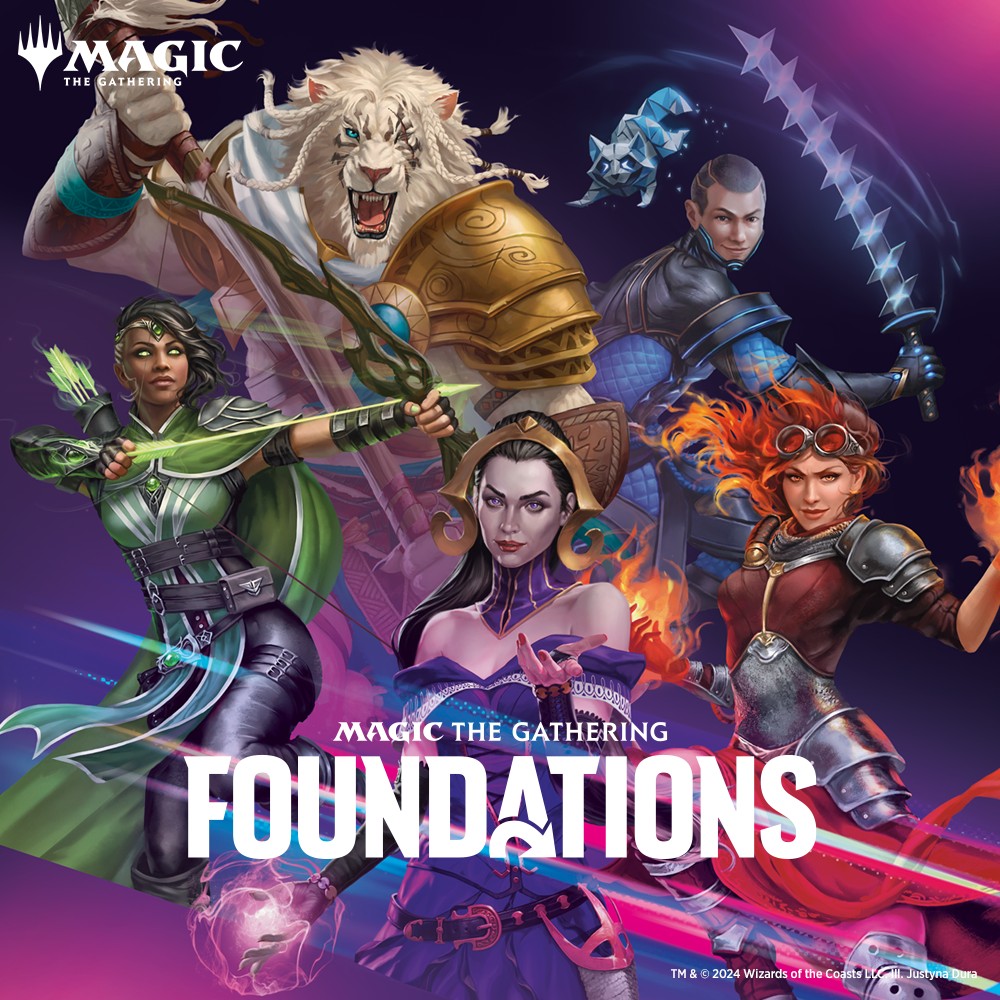In addition to showcasing the new cards from Aether Revolt, the Pro Tour in Dublin this coming weekend is also exciting as it marks a new Wizards of the Coast initiative called the Pro Tour Team Series. Banking off the popularity of the World Magic Cup and the massive fandom surrounding e-sports like League of Legends, Organized Play has decided to market the team aspect of professional Magic. Although most people watching the Pro Tour understand that groups of players work together to prepare and build decks, it hasn't always been clear which players are on which team due to individual t-shirt sponsorships that are more often tied to content. Coverage has had to jump through hoops to explain why someone wearing a Channel Fireball shirt is a member of Team Face to Face Games and so forth. While this might make sense for the individual player, it was seen as an obstacle to attracting sponsors from outside the Magic community and to presenting fans with a consistent narrative.
Enter the Team Series. For casual fans who do not follow the minutia of Organized Play announcements, this is basically a team competition that will play out over the course of the four Pro Tours in a season. Since the first Pro Tour has already taken place in Hawaii, the first iteration of the program, which they are calling a soft launch, will encompass the three remaining Pro Tours to be played before the World Championships that take place at the end of the season.
With this being a new program, there has been a lot of confusion about exactly what the Team Series entails, how it works, and why it's caused such a shake-up in the Pro Tour community. I'm going to try to answer some of the more common questions so that those of you watching Pro Tour Aether Revolt from home this weekend have some idea of what's going on, and what went on behind the scenes as professional Magic players adjusted to this new system.
How Many Players are there on a Pro Tour Team Series roster?
Initially, Wizards of the Coast announced that there would be nine players on each roster. The logic behind this announcement seems to have been a desire to have an end-of-the-year match between the two top teams to determine the season champion. In order to avoid any sort of manufactured tiebreaking system, it made sense to have an odd number of players on each team so that a clear winner could be easily determined. Since the idea was to have teams that would work together all year to prepare for tournaments, it also made sense to have at least eight players so that teams could run practice drafts. The third factor was a desire to accommodate players in geographical areas that don't have access to a large pool of qualified players and tend to work in small teams.
Although nine may seem like an arbitrary number, it's a natural result of trying to simultaneously satisfy these three criteria. As this season is a soft launch, however, Wizards of the Coast was willing to adjust the rules as they received feedback from the public and pro community. As it turns out, nine was a very awkward number for a lot of teams. It was still too large for the small teams and presented a dilemma for larger teams that tend to have rosters of around twelve players. How do these teams decide which nine to be on their official roster, and what happens to the leftovers? As WotC realized that teams were struggling to fall in line, they decided to make an adjustment.
As the soft launch kicks off at Pro Tour Aether Revolt, Team Series rosters will now comprise six players. While this makes determining an end-of-year champion through match play a little more difficult, it aligns a lot more with how players currently prepare for the Pro Tour. Small teams will have an easier time filling a lineup, and the larger teams can just register two or three rosters rather than worry about leaving people on the sidelines.
How do you get to be on a team?
Although there is some fine print regarding eligibility, the short answer is that anyone qualified for the first Pro Tour of the season has the option of registering on an official roster as long as they submit an official WotC application for approval. The rosters are locked in for the whole year, however, so serious teams will be loath to add a player who may miss some number of Pro Tours that they don't manage to qualify for. Consequently, most rosters pull from the pool of Gold, Platinum, and Hall of Fame players who have standing invitations to every Pro Tour.
What about players who qualify for an individual Pro Tour after the rosters are set?
The Pro Tour Team Series is designed to promote and highlight the competition between the top players who are fixtures at these high level events, but is not meant to detract in any way from the experience of those treating the path to the Pro Tour as a personal journey. Although money and resources are being allocated to the Team Series, none of this is coming out of the tournament prize money given out to individuals. If you qualify for the Pro Tour, you can expect the same experience and the same chance to win money, pro points, and qualifications as you would have in the past. You just might play against more people wearing team uniforms.
Although I don't have any inside information about WotC financial decisions or the allocation of resources, my understanding of the situation is that the money for the Team Series represents an effort to adjust marketing strategies in order to get more exposure for the Pro Tour while also helping to support the lifestyle of the professional Magic player. These are difficult and often conflicting goals, which is why there have been some mistakes made and a few controversies like last year's #paythepros.
Ultimately, the goal is to sustain professional Magic while rewarding tournament success and helping to sell the game. Appearance fees ensure that players are able to pay their bills and cover expenses, but is pretty much wasted money when it comes to exposure. Fans don't generally care how much a player was paid to show up, but are excited to see Brian Braun-Duin win $70,000 at the World Championships. A happy medium has to be found that markets the game while also allowing players to dedicate themselves to the Pro Tour without putting their livelihood at risk. Hotel rooms for Platinum players was the first item on the chopping block as players generally want to stay with their teammates anyway in the days leading up to the tournament.
How does the actual competition work?
Simple. The pro points earned by players at the Pro Tour count towards the team total. Rather than have to adjudicate exemptions for things like family emergencies, travel disruptions, visa issues, and other extenuating circumstances, the rules dictate that only the top five performers on each team are counted at each PT. This also allows teams to take a chance on a player who doesn't necessarily have all his qualifications lined up. While having someone miss a tournament certainly puts you at a disadvantage, the other five can at least compete on an even playing field without locking in a zero when other teams would earn at least the minimum three pro points awarded to every competitor.
What are the prizes?
For the soft launch, Wizards of the Coast will be awarding prize money totaling just over $50,000 to the top two finishing teams who compete in the final match at the World Championships. The winning team will receive $36,000 and the second place team will earn $14,400. If things going well, the plan is to ramp up to the prize money to somewhere in the vicinity of $200,000 which would be paid out to the top four teams at the end of the year.
The lower prize money for the first season makes some amount of sense since rules may be tweaked along the way, and because part of the allocation of funds will be coming from programs they are getting rid of but that will still be in place this year due to prior commitments and promised rewards.
Are there any other benefits besides this prize money?
In an effort to build on a consistent narrative, Wizards will also offering a limited number of Pro Tour qualifications. Basically, they want to avoid a situation where a member of one of the top finishing teams falls short of Gold and is kicked off a roster simply because there's a chance they would fail to qualify for a Pro Tour. To alleviate this risk, all competitors on the four highest finishing teams will receive an invitation along with airfare to the first Pro Tour of the following season. This qualification can stack with a Silver invite, guaranteeing that Silver players on a top team will get to play in the first two Pro Tours.
In addition, players on the top four teams vying for end of the year placement will all be guaranteed invitations and airfare to the final Pro Tour of the season in Kyoto. Fans watching their favorite team's progress will get to watch the entire team compete during the stretch run, even if one team member is having an off year and fails to qualify on individual merit.
How will you know who's on each team? What about players who prepare with one team but produce content for another website?
The thirty two official rosters who will compete in the soft launch of the Team Series were announced this past week on the Wizards of the Coast website here: Official Pro Tour Series Rosters. Also, in an effort to make the teams more recognizable to those following at home, players must all wear a WotC-approved team uniform.
This specific rule has created a bit of a stir in the pro community that has always treated tournament preparation as something completely separate from sponsorships and content deals. Many top players rely on these arrangements to pay their bills and cover the rising costs of traveling to and playing in premiere events. Now, all of a sudden, they are being told that they have to wear a team uniform and will lose out on the possibility of an individual sponsorship.
It's not all bad news for these pros, however, as many of the teams have acquired new sponsors as a result of the hype surrounding the Team Series. In some cases, players have chosen to realign allegiances in order to maintain their sponsorship. Others have just relinquished their individual deals in order to be on a good team. Wizards of the Coast are allowing players to wear a small patch or some other personalization of the uniform in order to represent a secondary sponsor, though the team logo still has to be the most prominent.
As far as sponsorships go, the Team Series may be a good thing down the road as it offers companies a lot more visibility and exposure than a few people just wearing a t-shirt, but there have definitely been some growing pains in this regard, and a number of pros are in a worse position now than they were last year.
What's going to happen to the superteams?
Over the past few years, the Pro Tour scene has been dominated by superteams like Face to Face, Channel Fireball, East West Bowl, MintCard, Eureka, and Dex Army. While the Team Series is an interesting development, the prize money, at least for the soft launch, is not enough for these teams to completely change their testing process. Although there was a lot of reshuffling as players attempted to work out sponsorship deals and group themselves into six person rosters, the superteams will remain intact and continue to work together to prepare for the Pro Tour. In most cases, the big teams will just register multiple rosters while continuing to work together as if nothing has changed. This may change next year when the prize money becomes more significant and teams look for competitive edges, but working in larger groups has consistently proved to be a mutual benefit, so I would expect the superteam dynamic to continue in some form or another, even if it ends up being mostly behind the scenes.
If the superteams are remaining intact, why have so many players been changing teams?
There are a few explanations for this. While the Team Series prize money for the first year is somewhat negligible compared to what you can earn for doing well at the Pro Tour, players are competitive and want to win the competition, even if doing so doesn't mean a lot financially. While players on superteams fill different roles and make different kinds of contributions, a lot of teams have tried to stack rosters that they expect to do well at the Pro Tour.
Team competitions tend to mitigate the inherent variance of the game which is why you see the top pros do well at Team Sealed Grand Prix. This is just another manifestation of that. While it's hard to predict exactly who will spike the next tournament, stacking a lineup will give you a significant edge against a team of second tier players. While there are thirty two teams registered, most pros feel that there are really only eight to ten teams that have a chance to compete for the top two positions. In reality, the number may be a lot smaller than that.
Another factor has been the sponsorship situation. While the extra Team Series money is nice, it was not enough to justify giving up content deals and t-shirt sponsorships. For now, a lot of players are viewing the competition itself as a bit of a freeroll, with sponsorship being the primary consideration. As a result, there are a few teams of mercenaries that have aligned themselves with other top players in order to field a competitive lineup, but that won't actually be working together. This may change when the Team Series goes into full swing next season when the incentives are sufficient to justify a change in philosophy.
Which are the best teams? Who are the early favourites?
Wizards of the Coast is banking on the fact that it's a lot more interesting to follow official teams rather than individual players, and the early returns seem to validate that fact. There has been a lot of speculation about which rosters have the best chance to win, and many players and fans have started to post predictions and power rankings.
The general consensus, at this point, is that the format heavily favours teams with stacked lineups who have done well at Pro Tours in the past. Here are my picks for the top five teams coming into the season.
1. Puzzle Quest
Owen Turtenwald
Reid Duke
William Jensen
Jon Finkel
Paul Rietzl
Andrew Cuneo
Featuring the Peach Garden Oath contingent, Puzzle Quest appears to be a stacked lineup of the best Channel Fireball: Pantheon has to offer. All of these players are feared opponents on the Pro Tour, and this is my early pick as the team to beat.
2. Musashi
Yuuya Watanabe
Kentaro Yamamoto
Shota Yasooka
Yuuki Ichikawa
Ken Yukuhiro
Teruya Kakumae
This amalgamation of top Japanese pros has a history of success at the top level, and, unlike the superteams, are used to working in smaller groups. While it's not clear that they'll all actually be working together, Yuuya and Shota, in particular, are always threats to do well in any tournament they enter.
3. Channel Fireball: Ice
Paulo Vitor Damo da Rosa
Eric Froehlich
Ben Stark
Mike Sigrist
Ondrej Strasky
Joel Larsson
4. Face to Face
Alexander Hayne
Jacob Wilson
Ivan Floch
Sam Pardee
Steve Rubin
Oliver Tiu
While the former Team Face to Face Games seems to have split along sponsorship lines rather than trying to stack a single lineup, both roster halves are forces to be reckoned with. This has been the most consistent and successful team over the past two years and I've heard that if the Team Series had existed, Face to Face would have won it last year, while Channel Fireball: Ice would have won the year before. While the CFB contingent has some new recruits, there weren't any better free agents on the market than Eric Froehlich, Ben Stark, and Joel Larsson. If the team continues to function as a cohesive unit, I could easily see these two rosters facing off in the final.
5. Genesis
Seth Manfield
Brad Nelson
Michael Majors
Lukas Blohon
Martin Muller
Martin Dang
Although he was nipped at the finish line for Player of the Year by Owen Turtenwald, Seth Manfield has been one of the most consistent players on the Pro Tour and headlines this mixture of SCG veterans and top European pros from the former Team EUreka. They're probably in fifth place on my personal power rankings, but certainly have the ability to contend for the title.
Although there will certainly be some growing pains, the Pro Tour Team Series could be a sign of what's to come as Magic tries to take its rightful spot alongside successful e-sports like Hearthstone and League of Legends. At the very least, it should be fun to watch as teams compete over the course of the year for a spot in the elusive final.


